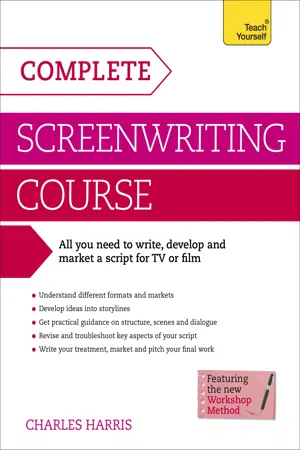Flashback
A flashback in literature is a narrative device that interrupts the present action to depict a scene from the past. It provides background information, adds depth to characters, and helps readers understand the story's development. Flashbacks are often used to reveal crucial details, create suspense, or offer insight into a character's motivations.
3 Key excerpts on "Flashback"
- eBook - ePub
Flashbacks in Film
Memory & History
- Maureen Turim(Author)
- 2013(Publication Date)
- Routledge(Publisher)
...Literature and theater certainly used techniques similar to the Flashback before cinema, but the etymology of this term for a return to a narrative past inserted in a narrative present is apparently derived from the speed with which cinematic editing was able to cut decisively to another space and time. Flash—the audience was transported in the movie’s time machine—back in time. It is my sense that only after the term “Flashback” was accepted in film criticism and screenwriting did it attain a more general application to literature and theater, both to describe contemporaneous works, and to be retrospectively applied to similar techniques of narration in earlier poems, novels, and plays. Eventually “Flashback” becomes incorporated into literary terminology, and its probable etymology as a cinematic term is not necessarily noted, as is indicated by the “plot” entry in M.H. Abrams’s A Glossary of Literary Terms : In the novel, the modern drama, and especially the motion picture, exposition is sometimes managed by Flashbacks: interpolated narratives or scenes (which may be justified as a memory or a revery, or as a confession by one of the characters) which represent events that happened before the point at which the work opened...
- eBook - ePub
Flashbacks in Film
A Cognitive and Multimodal Analysis
- Adriana Gordejuela(Author)
- 2021(Publication Date)
- Routledge(Publisher)
...Indeed, Flashbacks were not invented by film but have been employed in (Western) literature since its origins (cf., for instance, Genette, 1972, pp. 79–80; De Jong, 2014, pp. 135–137). Narratology uses the term analepsis to refer to these narrative retrospections, which Genette (1972, p. 82) defines as “any a posteriori evocation of an event previous to the point of the story in which we find ourselves”. 1 In other words, as defined by the Oxford English Dictionary (OED) (Analepsis, n.d.), analepsis is “[a] literary device in narrative, in which a past event is narrated at a point later than its chronological place in a story”. 1 The original definition is in French: “[T]oute évocation après coup d’un événement antérieur au point de l’histoire où l’on se trouve”. The translation is mine. Maureen Turim, in an extended study of film Flashbacks (the most comprehensive to date), offers a similar definition of the cinematic device: “a Flashback is simply an image or a filmic segment that is understood as representing temporal occurrences anterior to those in the images that preceded it” (Turim, 1989, p. 1). But, beyond the explanation of the term (which, in fact, matches the classical concept of analepsis), what is really interesting about Turim’s contribution is her review of the etymology of the term Flashback. Around the turn of the 20th century, the word flash was used to refer not only to a brief burst of light but also to talk about explosions and the ignition of engines as well as to refer to a particular kind of glance. And so, Turim argues (1989, p. 3), “[t]his combination of brief instances of light, of explosive power, and of the change in direction and quality of a glance are appropriate antecedents to the term Flashback in its cinematic sense”...
- eBook - ePub
Complete Screenwriting Course
A complete guide to writing, developing and marketing a script for TV or film
- Charles Harris(Author)
- 2014(Publication Date)
- Teach Yourself(Publisher)
...19 Playing with time – Flashbacks and non-linear stories Most screen stories run seamlessly forwards, without large jumps in time. However, there may be occasions when you need to break this rule. Changing the timeline can be very useful in dealing with a number of storytelling problems. However, playing with time, through Flashbacks and fractured or multiple timelines, should be relevant to the story, not imposed upon it as a gimmick, and also introduced with care, so as not to lose the audience. Linda Aronson, in The 21st-century Screenplay ‘Flashback is one of the most exciting storytelling techniques available to screenwriters.’ Using time jumps to help your story We saw earlier that a slow opening can be countered by creating a more dynamic subplot that can start the story. Another powerful method would be to open with a Flashback from a more dramatic scene later in the script. More radical changes to the storytelling order (the timeline) can be used to balance screenplays that change pace awkwardly or even shift genre – say, from action to drama. There are essentially seven ways you can change the timeline of your story. However, each also has its particular uses and meaning: 1 Flashback from the Act Three climax 2 Redemptive Flashback 3 Incremental Flashback 4 Exposition Flashback 5 Ironic Flashback 6 Parallel timelines 7 Fractured timeline. (For much of the material in the first half of this chapter I am indebted to Linda Aronson and her excellent breakdown of Flashbacks and fractured narrative in The 21st-century Screenplay.) Key idea Each type of Flashback has its own meaning. 1 Flashback FROM THE ACT THREE CLIMAX If the ending is tragic (such as the death of the hero), consider starting your story at the end with a Flashback from the end. By telling the audience how it ends in advance, you prepare them for the bad news. Linda Aronson calls this kind of Flashback ‘detective story of the human heart’...


